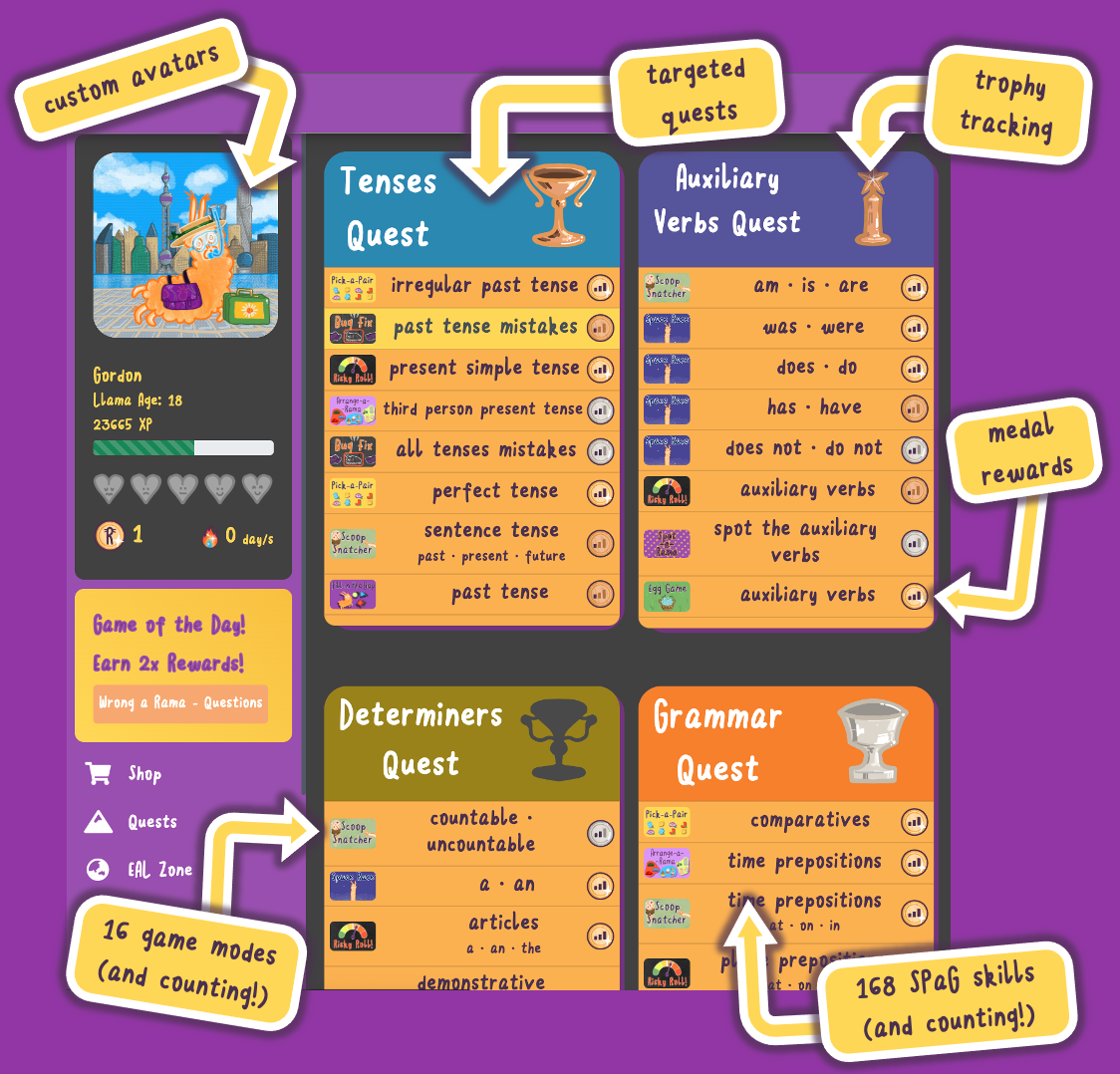🎯 How does Rollama encourage daily practice?
Incentivising students to come back regularly
Andrew from Rollama
Last Update 2 years ago
Our mission at Rollama is to encourage students to practise English SPAG regularly, and we've designed everything in Rollama towards that goal.
We have a range of game mechanics and rewards encourage regular practice and acknowledge effort.
Our celebration of small steps includes:
- Earning game medals
- Receiving Quest Trophies
- Leveling up each Llama Year
- Achieving a daily streak (play 10 turns in one day)
- Evolving their llama pet from baby to child to teenager to adult
We also have custom features such as Game of the Day and Teacher Tasks which you can design to focus their practise on objectives which matter most to your class.
Gamification
Gamification of learning via software has numerous benefits. Our system provides instant feedback on correct and incorrect inputs, tracks performance for formative adjustment to instruction[i], and provides large, differentiated question banks at an individualised level.
In-game rewards create an incentive for students to keep coming back regularly and enable the habitual rehearsal which leads to fluency.
Rollama is designed to adapt to users' needs as their proficiency increases. Teachers can track and guide usage to ensure students are getting the most out of the system.
Fun is a sign of a good fit between difficulty level and user proficiency. Our games are designed to engage students in a balanced way which does not cause frustration or boredom.
We knew gamification had an inherent benefit for learners. We've experienced ourselves — in learning coding, or Mandarin, or chess.
But even we were surprised when we read the largest meta-analysis of peer-reviewed studies in the features of gamification in learning.
When designing Rollama, many of these features were intuitive — here's the one-liner on why we included each one:
- Points and XP to feel a sense of progress and literally 'keep score'
- Leaderboards for healthy competition
- Medals and trophies to mark achievements
- Challenges and quests to focus the player's motivation
- Levels for difficulty and a sense of chapters and fresh starts
- Quizzes, well — it's what we do!
- Performance stats for meta-cognition and self-reflection
- Timers to keep things focused
- Avatars to give a sense of ownership and investment
- Competition to spark enthusiasm and energy
- Retries so failure is never a punishment, just a step in learning
- Increasing difficulty to form a constructive path over time
- In-game rewards to keep students coming back
- Adaptive difficulty to allow everyone to succeed
- Multiplayer because sometimes you want to share your learning with friends
[i] Wiliam, D. (2010). An Integrative Summary of the Research Literature and Implications for a New Theory or Formative Assessment, in H.L. Andrade and G.J. Cizek (eds.) Handbook of Formative Assessment. Taylor & Francis: New York.
EAL
Native speakers generally absorb the grammar of their L1 (first language) through usage alone. Some explicit teaching of uncommon or esoteric parts of speech may be necessary, plus some guidance on formal Standard English versus colloquial, informal constructs.
These complexities, dialects and spoken abbreviations can be bewildering for those learning English as an additional language (EAL).
At any age, EAL learners are at a particular disadvantage when school is the only place on which they encounter Standard English.
The language of the home and the playground provide the 360° immersion which native speakers take for granted.
Grammar must be explicitly taught for EAL students to attain native-speaker fluency. In mainstream classrooms, this is difficult as there is no additional challenge for native speakers (i.e., once a student has mastered using was/were with every sort of subject, there is no relevant extension to challenge them).
EAL learners need to know the rules then have sufficient opportunity to practise and notice their errors until automaticity is reached. The mainstream classroom does not always provide enough opportunities for this on its own. This is the seed of the problem which Rollama is built to solve.
More about the science behind our pedagogy: https://www.rollama.site/the-science-bit


